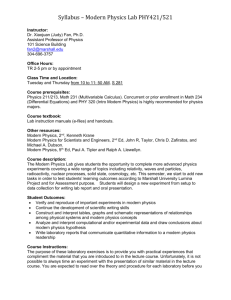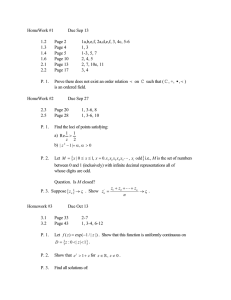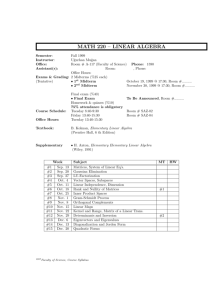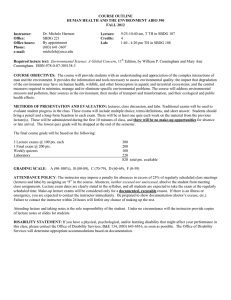Document 10886718
advertisement
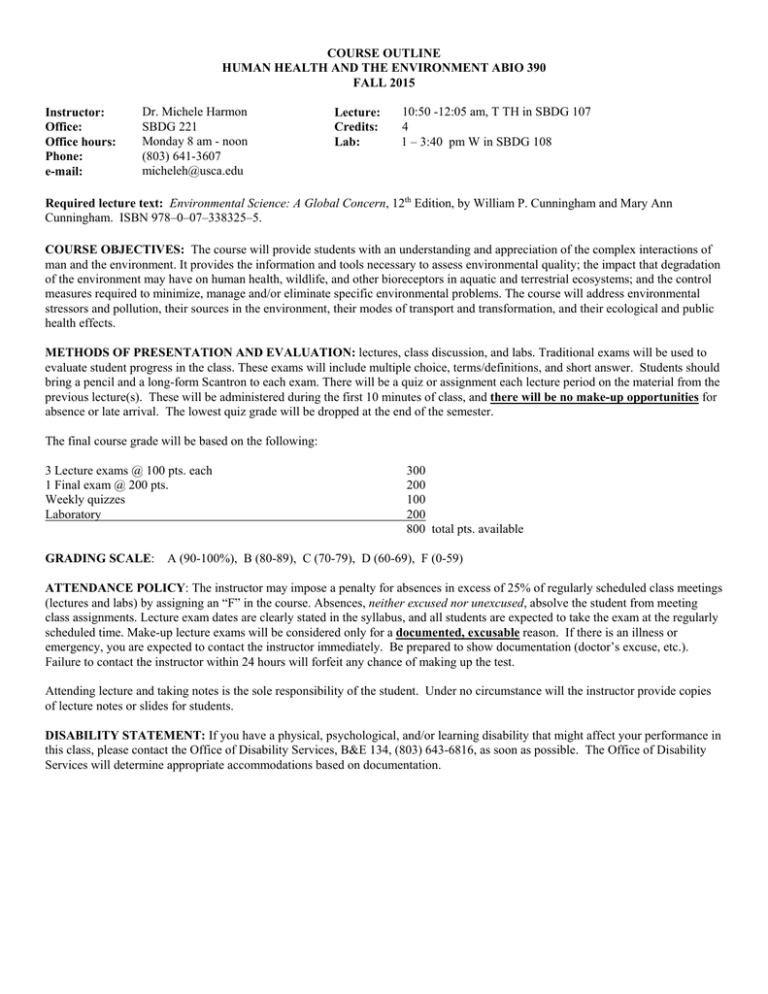
COURSE OUTLINE HUMAN HEALTH AND THE ENVIRONMENT ABIO 390 FALL 2015 Instructor: Office: Office hours: Phone: e-mail: Dr. Michele Harmon SBDG 221 Monday 8 am - noon (803) 641-3607 micheleh@usca.edu Lecture: Credits: Lab: 10:50 -12:05 am, T TH in SBDG 107 4 1 – 3:40 pm W in SBDG 108 Required lecture text: Environmental Science: A Global Concern, 12th Edition, by William P. Cunningham and Mary Ann Cunningham. ISBN 978–0–07–338325–5. COURSE OBJECTIVES: The course will provide students with an understanding and appreciation of the complex interactions of man and the environment. It provides the information and tools necessary to assess environmental quality; the impact that degradation of the environment may have on human health, wildlife, and other bioreceptors in aquatic and terrestrial ecosystems; and the control measures required to minimize, manage and/or eliminate specific environmental problems. The course will address environmental stressors and pollution, their sources in the environment, their modes of transport and transformation, and their ecological and public health effects. METHODS OF PRESENTATION AND EVALUATION: lectures, class discussion, and labs. Traditional exams will be used to evaluate student progress in the class. These exams will include multiple choice, terms/definitions, and short answer. Students should bring a pencil and a long-form Scantron to each exam. There will be a quiz or assignment each lecture period on the material from the previous lecture(s). These will be administered during the first 10 minutes of class, and there will be no make-up opportunities for absence or late arrival. The lowest quiz grade will be dropped at the end of the semester. The final course grade will be based on the following: 3 Lecture exams @ 100 pts. each 1 Final exam @ 200 pts. Weekly quizzes Laboratory GRADING SCALE: 300 200 100 200 800 total pts. available A (90-100%), B (80-89), C (70-79), D (60-69), F (0-59) ATTENDANCE POLICY: The instructor may impose a penalty for absences in excess of 25% of regularly scheduled class meetings (lectures and labs) by assigning an “F” in the course. Absences, neither excused nor unexcused, absolve the student from meeting class assignments. Lecture exam dates are clearly stated in the syllabus, and all students are expected to take the exam at the regularly scheduled time. Make-up lecture exams will be considered only for a documented, excusable reason. If there is an illness or emergency, you are expected to contact the instructor immediately. Be prepared to show documentation (doctor’s excuse, etc.). Failure to contact the instructor within 24 hours will forfeit any chance of making up the test. Attending lecture and taking notes is the sole responsibility of the student. Under no circumstance will the instructor provide copies of lecture notes or slides for students. DISABILITY STATEMENT: If you have a physical, psychological, and/or learning disability that might affect your performance in this class, please contact the Office of Disability Services, B&E 134, (803) 643-6816, as soon as possible. The Office of Disability Services will determine appropriate accommodations based on documentation. Schedule for ABIO 390, Fall 2015 Date Topic Aug. 20 Aug. 25 Aug. 27 Sep. 1 Sep. 3 Sep. 8 Sep. 10 Sep. 15 Sep. 17 Sep. 22 Sep. 24 Sep. 29 Oct. 1 Oct. 6 Oct. 8 Oct. 13 Oct. 15 Oct. 20 Oct. 22 Oct. 27 Oct. 29 Nov. 3 Nov. 5 Nov. 10 Nov. 12 Nov. 17 Nov. 19 Nov. 24 Nov. 26 Dec. 1 Dec. 3 Dec. 11 Introduction Ecosystems and Energy Sustainability, Biogeochemical Cycles, Biomes, and Succession Aquatic Ecosystems Aquatic Ecosystems Water Resources Water Resources Exam 1 Water Pollution Water Pollution and Greenwashing Population Dynamics Human Populations and Resource Use and Urbanization Human Populations and Resource Use and Urbanization Exam 2 Energy – Fossil Fuels Energy - Nuclear and Sustainable Alternatives for the Future Atmosphere and Ozone Local Air Pollution FALL BREAK Global Warming Solid and Hazardous Waste No Class Today No Class Today Toxicity and Risk Toxicity and Risk Exam 3 Infectious Disease and the Environment Food Borne Illness THANKSGIVING Food and Agriculture Pesticides and Genetically Modified Food Final Exam at 8:00 am Chapter in Textbook 3 3&4 5 5 17 17 18 18 6 7 & 22 7 & 22 19 & 20 19 & 20 15 & 16 15 & 16 15 21 8 8 8 9 & 10 9 & 10 CHANGES: The instructor reserves the right to make changes in the lecture or laboratory schedule, the number of quizzes and exams given, and the contents of each exam as deemed necessary. POLICY FOR PORTABLE ELECTRONIC DEVICES: The use of any portable electronic devices, including cell phones, pagers, MP3 players, iPods, etc., during class is not allowed for any reason unless prior approval has been given to a student from the instructor or unless required for the course. If you are planning to have any of these devices in class, they must be turned off and stowed away for the duration of the class period. If you use a portable electronic device during a test, quiz, or other assessment, you are eligible to receive a failing grade on that assignment. COMPUTER USE AND EMAIL: Lecture outlines and any additional materials (handouts, extra figures, bonus quizzes, etc.) will be provided for students on Blackboard. Students are urged to print necessary materials prior to class time. All official email communications, including class announcements, are made to USCA email accounts. Students should check their USCA email account on a regular basis and use this account for communication with the instructor. In order to protect the privacy of the student, the instructor will not reply to emails sent from non-USCA accounts (e.g., Hotmail, Yahoo, etc.). Lab Schedule for ABIO 390, Fall 2015 Date Aug. 26 Sept. 2 Sept. 9 Sept. 16 Sept. 23 Sept. 30 Oct. 7 Oct. 14 Oct. 21 Oct. 28 Nov. 4 Nov. 11 Nov. 18 Nov. 25 Dec. 2 Topic No Lab Virtual food web assignment - field day Using indicator organisms to determine pollutant effects - thermal Using indicator organisms to determine pollutant effects - pharmaceutical Ecologic footprint Population Growth experiment with Drosophila Toxicity tests with environmentally friendly products - Lumbriculus variegatus Toxicity tests with environmentally friendly products - Daphnia magna Fall Break Calculate the LC50 and prepare lab reports No lab this week Indoor Air Pollution Assessment Risk Assessment Assignment Thanksgiving Holliday No lab this week LABORATORY ATTENDANCE: Because of their nature, laboratory investigations cannot be made up. Therefore, students must attend laboratory sessions. If you miss a laboratory or field investigation, you will not be allowed to turn in the associated lab report. This also applies if you come in late, leave early, or do not participate fully. You cannot write a report on a laboratory or field investigation that you did not do. Laboratory Grading: The final lab grade makes up 25% of the total for the course and will be based on the following: Lab Topic Virtual food web assignment Using indicator organisms to determine pollutant effects - thermal Using indicator organisms to determine pollutant effects - pharmaceutical Toxicity tests with environmentally friendly products Ecologic footprint Population Growth Assignment Indoor Air Pollution Assessment Risk Assessment Assignment Points 25 25 25 40 10 25 25 25 200 total pts. available


